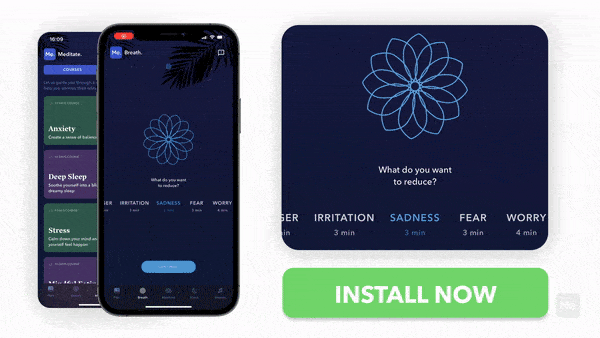You must have heard people chant or repeat specific words while inhaling and exhaling during meditation and yoga. These are not random words to pass time, but well-thought phrases with a strong meaning and immense benefits. Although mantras can be incorporated in any type of meditation practice, they were traditionally used in metta and transcendental meditations (6) (12). Here is everything you need to know about meditation mantras for beginners.
What is a mantra? With origin from the classical language of Indian and the liturgical language of Hinduism, Buddhism, and Jainism known as Sanskrit, the word mantra is coined from ‘manas’ or ‘man’ which means ‘a linear thinking mind’ and ‘tra’ which means ‘release’ (3). It is an equipment for the mind designed to help practitioners obtain a higher power and their true natures. So, what does mantra mean?
Simply put, mantras are short or long words, sounds, syllables, or phrases that are repeated over and over again during a meditation or a yoga session. Mantras create sound waves and frequencies that take you through or beyond the intellectual faculties straight into deeper consciousness and energy states. However, nowadays they are equated to repeated affirmations or spiritual aphorisms.
What Is The Purpose Of The Mantra During Meditation?
Meditation mantras are intersections between all the tangible energy of the body, and the intangible energy of sound i.e. vehicles for the brain to connect the physical world with insight. The purpose is to help you attain a state of deeper presence and awareness. In other words, the purpose of a mantra during meditation is to shut out the outside world so that you can concentrate on what you are feeling in the moment. They alter your consciousness, evoke positivity, and have the ability to transform the reality of your perception.
Meditation Mantras For Beginners: Chanting Your Way To Inner Peace
Most mantra meditation techniques have two essential components: mindfulness meditation and mantra recitation or chanting. What does chanting mean? To put it simply, it is saying or shouting repeatedly in a sing-song tone. Other than chanting, mantras can be sung, whispered, hummed, spoken, or repeated in the mind.
Many mantras chanted today date back to the Vedic times and were created by practitioners and sages of early Buddhism and Hinduism. During meditation, one navigates between the mind and body, and meditation mantras are a powerful way to increase your mindfulness or attention during the practice.
Reasons And Benefits Of Mantra Meditation
Just like any other meditation technique, people practice mantra meditation for a number of reasons such as:
- You can use it to strengthen your ‘mental shield’ against unwanted emotions or distractions. For example, when battling insomnia or coping with fears associated with travel.
- It may be used to focus your energy, develop psychic awareness, and open your chakras.
- You can practice mantra meditation to find a deeper spiritual purpose such as connecting with the divine.
- Mantra meditation can help you keep the mind receptive and focused on the blessings of the present moment (3).
Meditation Mantras For Beginners: Benefits
As you repeat a mantra audibly or silently, the harmony and vibrations sink deeper into your consciousness, and lead you to deeper states of awareness. This deep meditative state releases any blocked energy disrupting your health (3). Other benefits include:
- Elevates connection and enhances concentration (reduces wandering thoughts) (3). Mantras are like pillars for the brain to hold onto when emotions or thoughts threaten to distract you. In particular, conventional mantras have specific sound frequencies and meanings which soothe the senses, facilitating greater mindfulness. The focus does not stop at the end of the practice- it may extend to your daily activities, for instance, makes it easy for you to concentrate throughout the day (11).
- Cultivates awareness and raises your consciousness. Transcendental meditation, which requires you to repeat a mantra in your mind, helps you reach a point of total quietness and floods your body with a warm and pleasant feeling. Some people refer to this feeling as bliss, pure consciousness, or transcendence (11).
- Reinforces meditation goals, for example, to achieve inner peace, for self-motivation, or to accomplish higher focus etc. Most of the time you select a mantra that best suits your intention, therefore, repeating or chanting it emphasizes your goal for meditation (3).
- Positively influences mood, anxiety, and other neuropsychological parameters as established by a study published in The Journal of Alternative and Complementary Medicine whereby Kirtan Kriya meditation, a type of kundalini meditation involving mantra was examined (2).
Meditation Mantras For Beginners: Benefits (Part 2)
- Mantras in yoga and meditation may facilitate the release of secretions by stimulating secretions of the pituitary gland, strengthening our immune and neurological systems (4).
- Mantras lead to relaxation and enable you to better cope with unexpected stressors in life. In a 2017 scientific analysis of mantra-based meditation and its advantageous impacts published in the International Journal of Advanced Scientific Technologies in Engineering and Management Sciences, it was established that chanting may help synchronize the right and left sides of the brain, promoting alpha (relaxing) brain waves, and this synchronization may enhance brain function (8). Also, mantras have numerous benefits to the practitioner such as oxygenating the brain, reducing heart rate and blood pressure, creating a calm brainwave activity and achieving immunity from outside disturbance (8).
- Repeating mantras may help free your mind of background chatter and calm your nervous system. They may stimulate the parasympathetic nervous system i.e. the part of the nervous system that helps the body return to a calm and relaxed state. When activated, the body may naturally rejuvenate, repair and rebuild itself and you will be less stressed and depressed (1).
Meditation Mantras For Beginners: Benefits (Part 3)
- Clears your mind and enhances critical thinking, enabling you to make better choices because you are aware of your thoughts (8). Mantras give you a clear perspective because they are energetic sound formulas that slow you down and allow you to view everything clearly.
- Heals the mind and body from addictions such as smoking or alcohol, helping you detach emotions associated with such unhealthy habits. For instance, a personal mantra like “I am stronger than this, and it will pass” may help you overcome the urge to engage in substance abuse (10) (13).
- It enhances mental health. A systematic review in the European Journal of Integrative Medicine concluded that mantra meditation may enhance mental health and may be considered an important adjunct to workplace wellbeing initiatives or educational programmes (5).
- Makes you sleep better. You learn to worry less and it improves the quality of your sleep (11).
Note that you may not notice the benefits of mantras immediately. You may enjoy the full benefits after regularly practicing for weeks, months, or even years (11).
With stress being a constant presence in our lives, taking time to process emotions, decompress and get into the right frame of mind is absolutely crucial. With BetterMe: Meditation & Sleep app your mental health is in good hands! Start using it now!
Meditation Guides For Beginners Using Mantras: How To Do Mantra Meditation?
Meditation mantras help steady the mind. In transcendental meditation, you sit down anywhere comfortable, in your normal clothes, with eyes closed then whisper or repeat a mantra to yourself two times a day, for 20 minutes, so that you can calm down, relax, and achieve inner peace (12) (11). In Metta meditations, you send out positive energy and benevolent thoughts towards yourself and the others (6). Now that you know what mantra is, their purpose, reason, and benefits, it is time to learn how to use these essential tools during meditation. Here is an easy guide.
- Select the best mantras in line with your intention. Learn mantras that will help you achieve your goal, for instance to relax, be more patient, retain or maintain health, or cultivate a deeper spiritual connection.
- Settle down and remember your intention. Your meditation spot should be a private place free from interruptions.
- Sit properly and concentrate on your breathing. Focus on inhaling and exhaling to relax before starting your mantra recitation.
- Chant the mantras. Relax and be aware of the present moment. Go with the flow. You may also concentrate on the sound of the mantra. do this for as long as you’d like without putting pressure on your mind or body. Melt into complete bliss with mantra meditation!
Examples Of Common Meditation Mantras
Aum or Om, meaning It Is, Will Be or To Become, is a very common mantra, and interestingly, one of the non-spiritual yoga mantras because it represents creation itself, which is not owned by any religious tradition. You may use positive affirmations as mantra, if they appeal to you. Alternatively, you may have a personal mantra, i.e. a phrase or statement that inspires and motivates you to be at your best. Here are some powerful mantras that you can use:
-
Om Namah Shivaya
This is a Vedic mantra, salutation to Shiva, the lord of destruction and transformation, and one of the primary gods of the Hindu Trinity. It is often referred to as “the five-syllable-mantra” as it evokes the five elements of existence, i.e. earth, water, fire, air, and space. It heals and purifies.
-
Om Mani Padme Hum
Translated as “The jewel is in the lotus, or praise (hail) to the jewel in the lotus,” this mantra has strong roots in India and Tibet (7). This mantra implies that wisdom is obtained after darkness or ignorance is transformed into beauty and grace. Chanting this mantra makes you peaceful, loving, understanding, compassionate, and sets you free from resentment.
-
Lokah Samastah Sukinoh Bhavantu
Arising out of the Vedas, this mantra is mostly translated to mean ‘May all beings everywhere be happy and free, and may the thoughts, words, and actions of my own life contribute in some way to that happiness and to that freedom for all.’
-
I Am That I Am
This was God’s answer to Moses when Moses asked for His name. It is one of the most famous lines in the Hebrew Torah found in the Bible, and it reaffirms that God is all-knowing, omnipresent (present everywhere at the same time), and omnipotent (all-powerful). Therefore, if you are a firm believer, this mantra may increase your faith and trust in God, and allow Him to be in control all the time.
-
I Love You; I’m Sorry; Please Forgive Me; Thank You
Is an ancient Hawaiian Mantra practice known as Ho’oponopono meaning “Forgiveness and reconciliation practice, cleansing of ‘errors of thought’ which are the cause of problems and sickness in the physical world. ‘I love you’ opens the heart, ‘I’m sorry’ keeps you humble,‘Please forgive me’ means you acknowledge your imperfections, and ‘thank you’ is an expression of gratitude.
It helps clear the stagnant energy trapped in your body, particularly when you are overwhelmed with feelings of shame, anger, or other interpersonal issues. Through forgiveness, you open yourself up to all sorts of transformative healing energy.
Something tells us you often forget to put all the everyday hustle and bustle on hold and simply concentrate on yourself. It’s time to straighten out your priorities! Take a moment to heal, process your emotions, ground yourself, release all the pent-up tension and recharge with the BetterMe: Meditation & Sleep app before getting back into the race of life!
-
Ham-Sah
Same as I Am That I Am, this phrase means I am THAT in Hindu. It may help remind you that you are an observer, therefore helping you detach from your human suffering and experiences.
-
Hare Krishna
Saying “Hare Krishna Hare Krishna, Krishna Krishna Hare Hare, Hare Rama Hare Rama, Rama Rama, Hare Hare,“ you are simply repeating the many names of Krishna.
Other ancient mantras include:
- Aham Prema- means “I am Divine Love.”
- Om Shanti, Shanti, Shanti means “Peace of mind, body, and speech.”
- Om Tat Sat means “All that is.”
- Namo AmitaBha means Homage to the Buddha of boundless light.
- Lumen de Lumine- it is a chant of the light to help you feel open to the world
- Sat, Chit, Ananda means existence or being present, sense or feel, joy or bliss
-
Buddho
You don’t have to pronounce a mantra in Sanskrit for it to hold power; simply select something that resonates with you on a personal and profound level. Some modern-day common mantras include:
- I am breathing in, I am breathing out
- There is no danger
- I want nothing. I do nothing. I am nothing
- May my life be of benefit to all beings
- This too shall pass
- I will get better
- I change my thoughts, I change my world (by Norman Vincent Peale)
- Every day in every way I’m getting better and better (by Laura Silva)
- I have compassion for myself and others
- I am a magnet for health, wealth, and happiness
- May I be happy. May I be well. May I be safe. May I be peaceful and at ease (6).
- Let go and let god
- Every day is a new beginning
- I love myself, I believe in myself, I support myself
- Inhale the future, exhale the past
- May all beings everywhere be happy
- My heart will guide me
- I am content in this moment
- Everything I need is within me
- I am the change
- I am in an attitude of gratitude
- I am open to the possibilities of the universe
- I belong, I have faith
- My treasures lie within
- Disconnect to reconnect
- My life is full of joy
- I can and I will
- I am enough
- In me, I trust
- I feel. I exist.
- Past, present, and future are one
- Love is in everything, love is everything
- I am full of light
- I am my own healing power
- I attract prosperity
- I am a magnet for all that is good
Final Thought
This guide on meditation mantras for beginners should help you get the most out of meditation. Always pick a mantra that motivates you to be calm and focused, and stay consistent. You may print your favorite mantra on the wall, or write it down on the board. Remember to consult a trained mantra and meditation leader who will shed more light on the topic, and help you come up with personalized mantras.
DISCLAIMER:
This article is intended for general informational purposes only and does not address individual circumstances. It is not a substitute for professional advice or help and should not be relied on to make decisions of any kind. Any action you take upon the information presented in this article is strictly at your own risk and responsibility!
SOURCES:
- 10 Calming Mantras That Can Ease Depression (2017, everydayhealth.com)
- Effects Of An 8-week Meditation Program On Mood And Anxiety In Patients With Memory Loss (2012, liebertpub.com)
- Have Trouble Meditating? Try Mantra Meditation (2020, healthline.com)
- How To Activate The Pituitary Gland Through Yoga (2019, livestrong.com)
- Mantra Meditation For Mental Health In The General Population: A Systematic Review (2018, sciencedirect.com)
- Metta Meditation (n.d, mettainstitute.org)
- Prevalence And Patterns Of Use Of Mantra, Mindfulness And Spiritual Meditation Among Adults In The United States (2017, ncbi.nlm.nih.gov)
- Scientific Analysis of Mantra-Based Meditation and Its Beneficial Effects: An Overview (2017, .ijastems.org)
- The Science Behind Finding Your Mantra and How to Practice It Daily (2018, yogajournal.com)
- Tips to Help You Stay Sober (2019, webmd.com)
- Transcendental Meditation: Does It Work? (2014, theguardian.com)
- What Is The Best Type Of Meditation? (2017, medicalnewstoday)
- Why ‘one Day At A Time’ Works For Recovering Alcoholics (2020, sciencedaily.com)
















